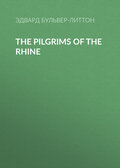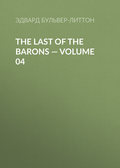
Эдвард Бульвер-Литтон
"My Novel" — Volume 04
CHAPTER XXIII
Mr. and Mrs. Avenel sat within the parlour, Mr. Richard stood on the hearthrug, whistling "Yankee Doodle." "The parson writes word that the lad will come to-day," said Richard, suddenly; "let me see the letter,— ay, to-day. If he took the coach as far as ———-, he might walk the rest of the way in two or three hours. He should be pretty nearly here. I have a great mind to go and meet him: it will save his asking questions, and hearing about me. I can clear the town by the back way, and get out at the high road."
"You'll not know him from any one else," said Mrs. Avenel.
"Well, that is a good one! Not know an Avenel! We've all the same cut of the jib,—have we not, Father?"
Poor John laughed heartily, till the tears rolled down his cheeks.
"We were always a well-favoured fam'ly," said John, recomposing himself. "There was Luke, but he's gone; and Harry, but he's dead too; and Dick, but he's in Amerikay—no, he's here; and my darling Nora, but—"
"Hush!" interrupted Mrs. Avenel; "hush, John!"
The old man stared at her, and then put his tremulous hand to his brow. "And Nora's gone too!" said he, in a voice of profound woe. Both hands then fell on his knees, and his head drooped on his breast.
Mrs. Avenel rose, kissed her husband on the forehead, and walked away to the window. Richard took up his hat and brushed the nap carefully with his handkerchief; but his lips quivered.
"I 'm going," said he, abruptly. "Now mind, Mother, not a word about uncle Richard yet; we must first see how we like each other, and—[in a whisper] you'll try and get that into my poor father's head?"
"Ay, Richard," said Mrs. Avenel, quietly. Richard put on his hat and went out by the back way. He stole along the fields that skirted the town, and had only once to cross the street before he got into the high road.
He walked on till he came to the first milestone. There he seated himself, lighted his cigar, and awaited his nephew. It was now nearly the hour of sunset, and the road before him lay westward. Richard, from time to time, looked along the road, shading his eyes with his hand; and at length, just as the disk of the sun had half sunk down the horizon, a solitary figure came up the way. It emerged suddenly from the turn in the road; the reddening beams coloured all the atmosphere around it. Solitary and silent it came as from a Land of Light.
CHAPTER XXIV
"You have been walking far, young man?" said Richard Avenel.
"No, sir, not very. That is Lansmere before me, is it not?"
"Yes, it is Lansmere; you stop there, I guess?"
Leonard made a sign in the affirmative, and walked on a few paces; then, seeing the stranger who had accosted him still by his side, he said,—
"If you know the town, sir, perhaps you will have the goodness to tell me whereabouts Mr. Avenel lives?"
"I can put you into a straight cut across the fields, that will bring you just behind the house."
"You are very kind, but it will take you out of your way."
"No, it is in my way. So you are going to Mr. Avenel's?—a good old gentleman."
"I've always heard so; and Mrs. Avenel—"
"A particular superior woman," said Richard. "Any one else to ask after?—I know the family well."
"No, thank you, sir."
"They have a son, I believe; but he's in America, is he not?"
"I believe he is, sir."
"I see the parson has kept faith with me muttered Richard."
"If you can tell me anything about HIM," said Leonard, "I should be very glad."
"Why so, young man? Perhaps he is hanged by this time."
"Hanged!"
"He was a sad dog, I am told."
"Then you have been told very falsely," said Leonard, colouring.
"A sad wild dog; his parents were so glad when he cut and run,—went off to the States. They say he made money; but, if so, he neglected his relations shamefully."
"Sir," said Leonard, "you are wholly misinformed. He has been most generous to a relation who had little claim on him: and I never heard his name mentioned but with love and praise."
Richard instantly fell to whistling "Yankee Doodle," and walked on several paces without saying a word. He then made a slight apology for his impertinence, hoped no offence, and, with his usual bold but astute style of talk, contrived to bring out something of his companion's mind. He was evidently struck with the clearness and propriety with which Leonard expressed himself, raised his eyebrows in surprise more than once, and looked him full in the face with an attentive and pleased survey. Leonard had put on the new clothes with which Riccabocca and his wife had provided him. They were those appropriate to a young country tradesman in good circumstances; but as Leonard did not think about the clothes, so he had unconsciously something of the ease of the gentleman.
They now came into the fields. Leonard paused before a slip of ground sown with rye.
"I should have thought grass-land would have answered better so near a town," said he.
"No doubt it would," answered Richard; "but they are sadly behind-hand in these parts. You see the great park yonder, on the other side of the road? That would answer better for rye than grass; but then, what would become of my Lord's deer? The aristocracy eat us up, young man."
"But the aristocracy did not sow this piece with rye, I suppose?" said Leonard, smiling.
"And what do you conclude from that?"
"Let every man look to his own ground," said Leonard, with a cleverness of repartee caught from Dr. Riccabocca.
"'Cute lad you are," said Richard; "and we'll talk more of these matters another time."
They now came within sight of Mr. Avenel's house.
"You can get through the gap in the hedge, by the old pollard-oak," said Richard; "and come round by the front of the house. Why, you're not afraid, are you?"
"I am a stranger."
"Shall I introduce you? I told you that I knew the old couple."
"Oh, no, sir! I would rather meet them alone."
"Go; and—wait a bit-hark ye, young man, Mrs. Avenel is a cold-mannered woman; but don't be abashed by that." Leonard thanked the good-natured stranger, crossed the field, passed the gap, and paused a moment under the stinted shade of the old hollow-hearted oak. The ravens were returning to their nests. At the sight of a human form under the tree they wheeled round and watched him afar. From the thick of the boughs, the young ravens sent their hoarse low cry.
CHAPTER XXV
The young man entered the neat, prim, formal parlour. "You are welcome!" said Mrs. Avenel, in a firm voice. "The gentleman is heartily welcome," cried poor John.
"It is your grandson, Leonard Fairfield," said Mrs. Avenel. But John, who had risen with knocking knees, gazed hard at Leonard, and then fell on his breast, sobbing aloud, "Nora's eyes!—he has a blink in his eye like Nora's."
Mrs. Avenel approached with a steady step, and drew away the old man tenderly.
"He is a poor creature," she whispered to Leonard; "you excite him. Come away, I will show you your room." Leonard followed her up the stairs, and came into a room neatly and even prettily furnished. The carpet and curtains were faded by the sun, and of old-fashioned pattern; there was a look about the room as if it had been long disused. Mrs. Avenel sank down on the first chair on entering. Leonard drew his arm round her waist affectionately: "I fear that I have put you out sadly, my dear grandmother." Mrs. Avenel glided hastily from his arm, and her countenance worked much, every nerve in it twitching, as it were; then, placing her hand on his locks, she said with passion, "God bless you, my grandson," and left the room.
Leonard dropped his knapsack on the floor, and looked around him wistfully. The room seemed as if it had once been occupied by a female. There was a work-box on the chest of drawers, and over it hanging shelves for books, suspended by ribbons that had once been blue, with silk and fringe appended to each shelf, and knots and tassels here and there,—the taste of a woman, or rather of a girl, who seeks to give a grace to the commonest things around her. With the mechanical habit of a student, Leonard took down one or two of the volumes still left on the shelves. He found Spenser's "Faerie Queene," Racine in French, Tasso in Italian; and on the fly-leaf of each volume, in the exquisite handwriting familiar to his memory, the name "Leonora." He kissed the books, and replaced them with a feeling akin both to tenderness and awe.
He had not been alone in his room more than a quarter of an hour before the maid-servant knocked at his door and summoned him to tea.
Poor John had recovered his spirits, and his wife sat by his side, holding his hand in hers. Poor John was even gay. He asked many questions about his daughter Jane, and did not wait for the answers. Then he spoke about the squire, whom he confounded with Audley Egerton, and talked of elections and the Blue party, and hoped Leonard would always be a good Blue; and then he fell to his tea and toast, and said no more.
Mrs. Avenel spoke little, but she eyed Leonard askant, as it were, from time to time; and, after each glance, the nerves of the poor severe face twitched again.
A little after nine o'clock, Mrs. Avenel lighted a candle, and placing it in Leonard's hand, said, "You must be tired,—you know your own room now. Good-night."
Leonard took the light, and, as was his wont with his mother, kissed Mrs. Avenel on the cheek. Then he took John's hand and kissed him too. The old man was half asleep, and murmured dreamily, "That's Nora."
Leonard had retired to his room about half an hour, when Richard Avenel entered the house softly, and joined his parents.
"Well, Mother?" said he.
"Well, Richard, you have seen him?"
"And like him. Do you know he has a great look of poor Nora?—-more like her than Jane."
"Yes; he is handsomer than Jane ever was, but more like your father than any one. John was so comely. You take to the boy, then?"
"Ay, that I do. Just tell him in the morning that he is to go with a gentleman who will be his friend, and don't say more. The chaise shall be at the door after breakfast. Let him get into it: I shall wait for him out of the town. What's the room you gave him?"
"The room you would not take."
"The room in which Nora slept? Oh, no! I could not have slept a wink there. What a charm there was in that girl! how we all loved her! But she was too beautiful and good for us,—too good to live!"
"None of us are too good," said Mrs. Avenel, with great austerity, "and I beg you will not talk in that way. Goodnight,—I must get your poor father to bed."
When Leonard opened his eyes the next morning, they rested on the face of Mrs. Avenel, which was bending over his pillow. But it was long before he could recognize that countenance, so changed was its expression,—so tender, so mother-like. Nay, the face of his own mother had never seemed to him so soft with a mother's passion.
"Ah!" he murmured, half rising, and flinging his young arms round her neck. Mrs. Avenel, this time taken by surprise, warmly returned the embrace; she clasped him to her breast, she kissed him again and again. At length, with a quick start, she escaped, and walked up and down the room, pressing her hands tightly together. When she halted, her face had recovered its usual severity and cold precision.
"It is time for you to rise, Leonard," said she. "You will leave us to-day. A gentleman has promised to take charge of you, and do for you more than we can. A chaise will be at the door soon,—make haste."
John was absent from the breakfast-table. His wife said that he never rose till late, and must not be disturbed.
The meal was scarcely over before a chaise and pair came to the door.
"You must not keep the chaise waiting,—the gentleman is very punctual."
"But he is not come."
"No; he has walked on before, and will get in after you are out of the town."
"What is his name, and why should he care for me, Grandmother?"
"He will tell you himself. Be quick."
"But you will bless me again, Grandmother? I love you already."
"I do bless you," said Mrs. Avenel, firmly. "Be honest and good, and beware of the first false step." She pressed his hand with a convulsive grasp, and led him to the outer door.
The postboy clanked his whip, the chaise rattled off. Leonard put his head out of the window to catch a last glimpse of the old woman; but the boughs of the pollard-oak, and its gnarled decaying trunk, hid her from his eye, and look as he would, till the road turned, he saw but the melancholy tree.






